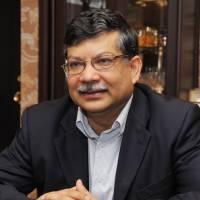While Bangladesh remains grateful to Japan for its continued support over the last four decades as a leading development partner since its 1971 independence from Pakistan, the two countries can further strengthen ties both economically and culturally, said Masud Bin Momen, Dhaka's ambassador to Japan since November.
In a Tuesday courtesy call on The Japan Times, Momen, 49, said Bangladesh boasts 6 percent annual economic growth and its exports to Japan have increased in recent years. However, such achievements are often "overshadowed by massive media coverage of some recent tragic event, including the (garment) factory accident in April."
The death of 1,127 workers — mostly female — when a factory building in Savar, on the outskirts of Dhaka, collapsed, created a lot of empathy among the Japanese people, he said.
"It's also a wake-up call for Bangladesh (within the international community) of how to address this situation.
"We are under a lot of pressure. . . . We have to tackle how to improve factory safety and other compliance issues," the ambassador said.
Thanks to the late Japanese politician Takashi Hayakawa's endeavors to spearhead creation of good diplomatic relations between the two countries, Momen said a lot of good will and sympathy has existed between the two countries for four decades.
Hayakawa, a House of Representatives member from the Liberal Democratic Party and the first head of the Japan-Bangladesh Association, visited the country right after diplomatic relations were established in 1972.
"Japan was involved in reconstruction and rehabilitation of the newly independent Bangladesh," Momen said. In stressing the close ties between the two countries, he cited Hayakawa's words that "Bangladeshis are the most Japanese-friendly people in the world."
The ambassador said approximately 11,400 Bangladeshis currently reside in Japan and the first Bengali language course was introduced last year at Tokyo University of Foreign Studies.



















With your current subscription plan you can comment on stories. However, before writing your first comment, please create a display name in the Profile section of your subscriber account page.